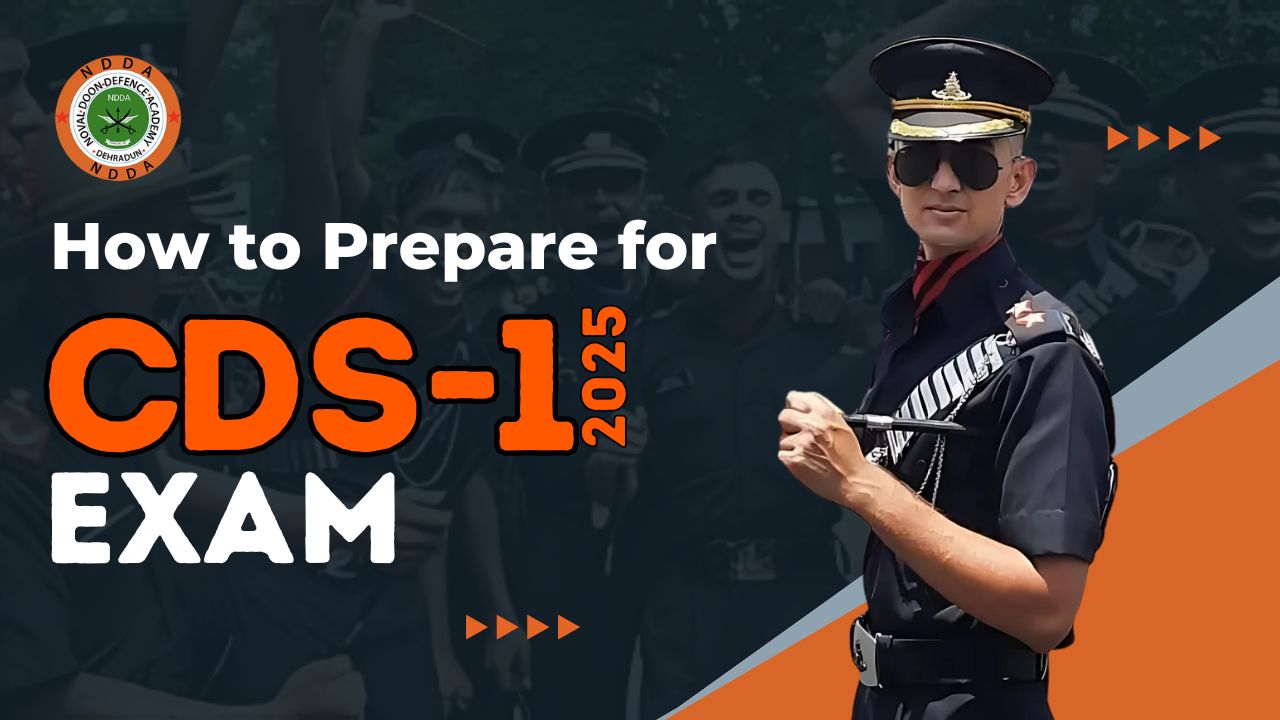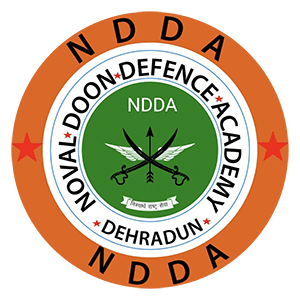How to Prepare for CDS 1 2025 Exam: A Complete Step-by-Step Guide to Success

Table of Contents
The Combined Defence Services (CDS) exam is a gateway to a career that not only demands dedication but also expects discipline and consistent effort. If you aim to clear this prestigious exam, you need a game plan. Whether you’re already studying or thinking of balancing it with work, planning in advance gives you the upper hand. Here’s your ultimate guide on how to prepare for CDS 1 2025 exam, from understanding the exam pattern to mastering revision strategies.
Understanding the CDS Exam Pattern
Before jumping into the preparation, it’s essential to fully understand the CDS exam structure. The better you know the exam pattern, the easier it becomes to tailor your preparation.
- Written Exam Breakdown: The CDS written exam comprises three sections: English, General Knowledge (GK), and Elementary Mathematics. Each paper is 100 marks, with a duration of two hours per section. If you’re applying for OTA (Officers’ Training Academy), the math paper won’t be part of your test.
- SSB Interview Process: Once you pass the written exam, the next challenge is the Services Selection Board (SSB) interview. This involves intelligence tests, group discussions, and personality assessments. Your ability to communicate, think on your feet, and display leadership qualities are all tested.
- Physical Fitness and Medical Tests: Apart from intellectual rigor, physical fitness plays a significant role. Start incorporating regular exercise into your routine to build stamina and flexibility. And don’t forget the medical test, It’s vital to meet all the health standards set by the defense forces.
Setting a Study Plan for CDS 1 2025
Studying without a plan is like driving without a map—you might get somewhere, but it probably won’t be where you wanted to go, Creating a structured study plan can help you stay on track and avoid that last-minute panic.
- Create an Effective Daily/Weekly Study Schedule: Start with daily goals. For example, allocate two hours for math, one hour for English, and one hour for GK. Don’t overwhelm yourself—keep it balanced. Weekly targets give you flexibility but keep you moving forward.
- Prioritize Based on Strengths and Weaknesses: If you’re a good at English but math makes your head spin, spend more time strengthening your weak areas. At the same time, don’t neglect your strong subjects—keep practicing to maintain them.
Subject-Wise Preparation Tips
| Subject | Key Focus Areas | Preparation Strategy |
| English | Grammar, Vocabulary, Comprehension | – Read newspapers daily to enhance vocabulary and comprehension skills. |
| – Practice spotting errors and sentence improvement questions. | ||
| – Solve previous year papers to get familiar with the question types. | ||
| General Knowledge (GK) | Current Affairs, History, Geography | – Stay updated with current events by reading daily news and monthly magazines like Pratiyogita Darpan. |
| – Focus on Indian history, geography, economics, and international relations. | ||
| – Use quizzes and mock tests to reinforce your GK knowledge. | ||
| Mathematics | Arithmetic, Algebra, Geometry | – Break down topics like number systems, algebraic identities, and trigonometry into daily practice sessions. |
| – Solve at least 30-40 problems daily to improve speed and accuracy. | ||
| – Review important formulas and theorems regularly. |
- English: This paper tests your grammar, vocabulary, and comprehension skills. To prepare, read newspapers, solve past papers, and work on error detection questions.
- General Knowledge: For GK, stay updated with current affairs and important historical events. Geography, economics, and international relations often pop up in the exam, so be ready.
- Math: Mathematics in CDS isn’t too difficult but requires consistent practice. Focus on topics like trigonometry, algebra, and geometry, and make sure to solve at least 20-30 problems daily.
Choosing the Right Study Material and Resources
Choosing the right study material can make or break your preparation. There are countless books and online resources, but the challenge lies in selecting the ones that will actually help you.
- Standard Books: Pick up books that have been recommended by toppers or coaching centers. Some go-to options include “Pathfinder for CDS” by Arihant and “Objective General English” by S.P. Bakshi. These books cover all topics comprehensively.
- Online Resources: Websites, and YouTube channels dedicated to defense exam preparation can be incredibly useful. Just be careful not to get lost in the sea of information
Mock Tests and Revision Strategy
Your preparation won’t be complete without regular mock tests and thorough revision. Here’s why:
- Regular Mock Tests: These aren’t just about practicing questions but also about improving speed and accuracy. Set a timer and simulate real exam conditions to see where you stand.
- Best Practices for Revising Key Concepts: When revising, don’t just read the theory—practice questions alongside. Solve previous year papers and focus on the mistakes you made during mocks.
- Creating a Revision Plan: In the last few months, shift your focus toward revision. Go over important formulas, key historical events, and grammar rules. Make quick notes to glance at during the final days before the exam.
Why NDDA is the Best CDS Academy in Dehradun
When it comes to choosing the right coaching center, Noval Doon Defence Academy (NDDA) stands out for several reasons. Not only does it have experienced faculty, but it also provides personalized attention to students. Here’s why NDDA should be on your radar:
- Comprehensive Curriculum: NDDA’s syllabus coverage is on point. Whether it’s English or math, the faculty ensures that every topic is addressed in detail.
- SSB Interview Preparation: At NDDA, it’s not just about the written exam. The academy offers extensive SSB interview coaching, helping you get ready for the challenges ahead.
- Focus on Fitness: Physical fitness is an essential aspect of CDS preparation, and NDDA doesn’t take that lightly. The academy incorporates fitness training into its schedule, ensuring students are well-rounded in every aspect of their preparation.
Conclusion
Preparing for CDS 1 2025 can feel like a massive challenge, but with the right approach, it’s entirely manageable. From understanding the exam pattern and setting up an effective study plan to revising key concepts and taking regular mock tests, every step brings you closer to your goal. The key is to stay consistent and not let minor setbacks discourage you. Remember, success is a combination of hard work, smart strategies, and perseverance.
So, are you ready to start your journey toward success in the CDS 1 2025 exam? Begin today, and with the right attitude and preparation, you’ll be well on your way to joining the esteemed ranks of the Indian Armed Forces.
FAQs for How to Prepare for CDS 1 2025 Exam
Starting early gives you a huge advantage ideally, begin your preparation 8-10 months in advance to cover the entire syllabus and have enough time for revision and mock tests. If you’re balancing college or work, an early start also helps you avoid the last-minute scramble.
Keep it simple and realistic. Break your day into smaller chunks of study time, like 2-3 hours each for English, GK, and Mathematics. Make sure to add some breaks in between so you don’t burn out. Weekly goals can also help track your progress without making it too stressful.
Time management is key. Allocate fixed hours each day dedicated to CDS prep. If your weekdays are tight, use weekends for longer study sessions. You can also prioritize tough subjects on days when you have more time.
Physical fitness is super important, especially for clearing the medical tests and the SSB interview phase. Start working on your fitness early by incorporating cardio, strength training, and flexibility exercises into your routine.
The written exam has three sections: English, General Knowledge, and Elementary Mathematics. Each paper is worth 100 marks and lasts two hours. However, if you’re aiming for OTA, you’ll only need to clear the English and GK papers.
Stick to standard books like “Pathfinder for CDS” by Arihant or “Objective General English” by S.P. Bakshi. Also, stay updated with current affairs and use online platforms like The Hindu or YouTube for additional learning. Just avoid overwhelming yourself with too many resources.
Start taking mock tests once you’re halfway through your syllabus. Weekly mocks are great for tracking progress, but increase the frequency as the exam date gets closer. Simulating exam conditions helps improve time management and reduces exam anxiety.
The last few months are all about revision. Focus on key concepts, formulas, and important historical events. Make quick notes for each subject and keep revisiting them. Don’t forget to practice previous year papers—they’re a goldmine for understanding the exam pattern.
Focus more on your weak areas, but don’t neglect your strengths. Spend more time on subjects where you’re struggling, while regularly revisiting topics you’re good at to keep them sharp. It’s all about balance, so create a study plan that prioritizes both.
Reach Us
